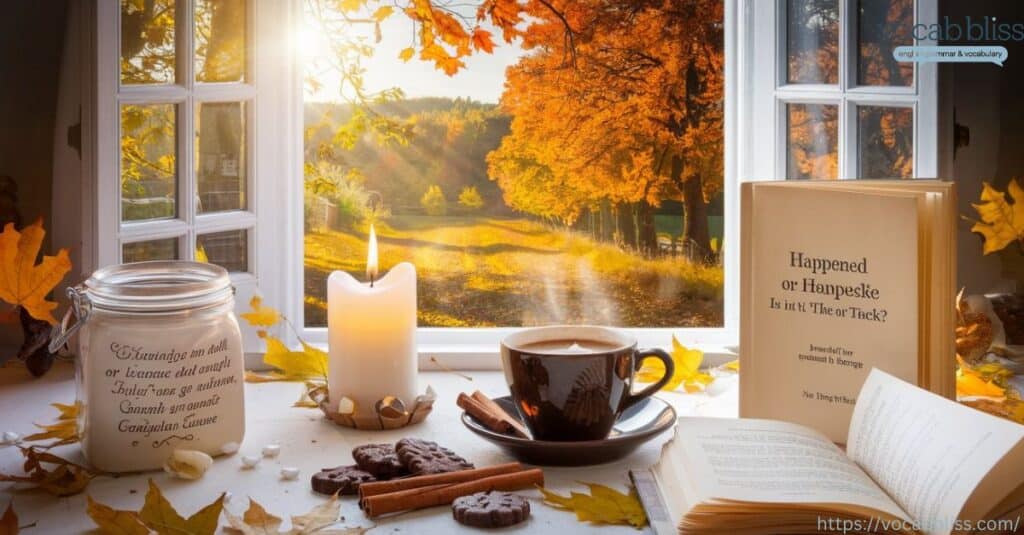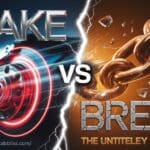When it comes to spelling in English, many people encounter pitfalls that can muddle their writing. A common source of confusion is knowing how to spell happend correctly. The correct form is actually “happened,” with an extra “e” before the “-ed” ending. Remembering this difference can help you avoid mistakes, especially in formal writing.
This guide will explore the correct usage, definitions, and the common mistakes people make when dealing with these words. By the end, you’ll know how to spell “happened” and why “happend” is a misspelling.
Understanding the Basics of “Happend or Happened”
Definition and Correct Spelling
To start, “happened” is the past tense of the verb “happen.” It refers to events or actions that occurred previously. For example, you might say, “The concert happened last night,” indicating that the event took place in the past.
On the other hand, “happend” is simply a misspelling of “happened.” It does not exist in the English language and holds no meaning. Many people mistakenly type “happend” due to its phonetic similarity to “happen,” but it is important to remember that correct spelling matters in effective communication.
Common Misunderstandings
The confusion between “happened” and “happend” often arises from phonetic similarities. People might type “happend” without realizing their mistake, especially in fast-paced writing situations like texting or informal emails.
Here’s a quick list of why this error might occur:
- Phonetic Confusion: Both words sound alike when spoken, leading to misunderstandings when written.
- Typing Errors: Rapid typing can result in accidental misspellings.
- Lack of Awareness: Some may not realize that “happend” is incorrect.
How Do You Spell Happened?
The correct spelling is “happened” with two ‘p’s and an ‘ed’ ending. “Happened” is the past tense of the verb “happen,” used to describe events that took place in the past. Spelling it as “happend” is a common mistake, likely due to phonetic similarities or fast typing. Remembering the correct form is essential, especially in formal writing, where accuracy adds professionalism. For instance, in a sentence, you would say, “The meeting happened yesterday,” not “The meeting happend yesterday.”
To help solidify this understanding, here’s a quick chart that breaks down the differences between the correct and incorrect forms:
| Correct Spelling | Incorrect Spelling | Explanation | Example |
|---|---|---|---|
| Happened | Happend | Standard past tense of “happen” | “The event happened last night.” |
| “Happend” is a misspelling with no usage. | “The event happend last night.” (X) |
Following this chart helps you avoid mistakes, ensuring you always use “happened” correctly in your writing.
The Correct Form: Happened
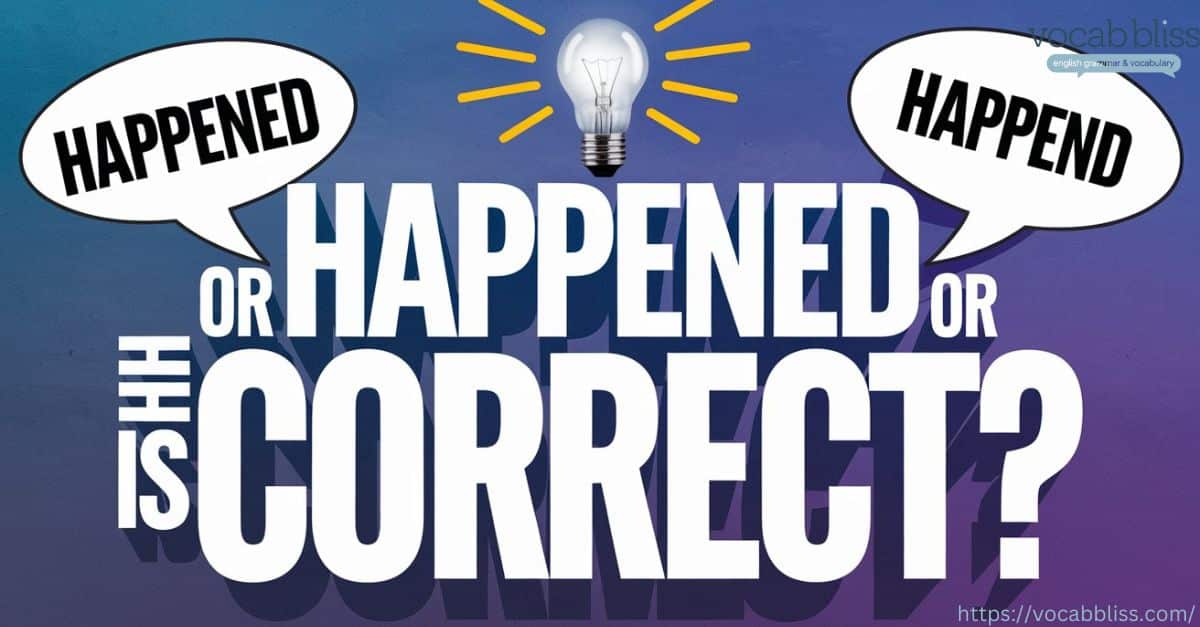
Definition and Usage
As mentioned earlier, “happened” is the past tense form of “happen.” It refers to events that have occurred. For instance:
- “The meeting *happened* at 3 PM yesterday.”
- “Several remarkable things *happened* during the event.”
In these examples, “happened” clarifies that the events took place in the past.
Grammatical Context
In English grammar, understanding how to use “happened” correctly involves knowing its placement in various sentence structures. Here are some common grammatical contexts where “happened” can be used effectively:
- Simple Past: “She happened to see him at the store.”
- Past Perfect: “By the time we arrived, the party had already happened.”
- Past Continuous: “They were discussing what had happened earlier.”
“How to Spell Happened”
To ensure you “happened spelling” correctly, you can break it down into syllables: hap-pened. The structure contains a single ‘p’ and ends with ‘ed.’ It’s a good practice to familiarize yourself with common past tense verb endings like “-ed,” which often signify actions completed in the past.
Why “Happend” and “happends” is Incorrect
Spelling Rules in English
The English language has specific spelling rules that help clarify why “happend” is not acceptable. Here are a few guidelines:
- Doubling Consonants: When a one-syllable verb ends in a single consonant preceded by a single vowel, we often double the consonant before adding “-ed.” For example, “tap” becomes “tapped,” and “hop” becomes “hopped.” However, in “happen,” the last consonant ‘p’ is followed by ‘ed’ without doubling, which leads to the correct spelling “happened.”
- Standard Dictionaries: According to reputable dictionaries like Merriam-Webster and the Oxford English Dictionary, “happend” is not listed as a recognized word. Instead, they provide “happened” as the correct term.
Common Mistakes to Avoid
Here are some mistakes to watch for when using “happened”:
- Misusing it in Present Tense: “Yesterday, I happend to find my keys.” (Incorrect)
- Correction: “Yesterday, I happened to find my keys.”
- Confusing It with “Happen”: “What happend next?” (Incorrect)
- Correction: “What happened next?”
To remember the correct spelling, try associating “happened” with a memorable phrase, like “It happened yesterday.” This mnemonic can help solidify your understanding.
“How to Spell Happend” Correctly
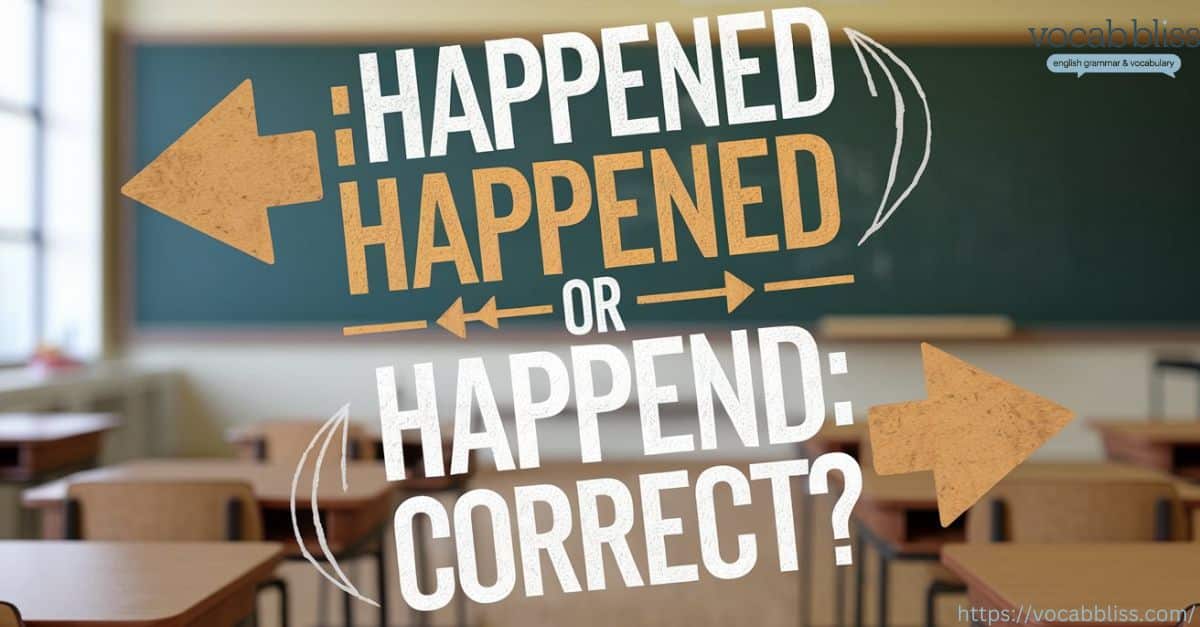
If you’re wondering how to spell “happend,” here’s the quick answer: it’s actually spelled “happened.” The term “happend” is a common misspelling of the correct past tense form of “happen,” which is used to describe events that took place in the past.
For example, instead of saying “A funny thing happend at work,” the correct spelling is, “A funny thing happened at work.” Remember to add that extra “e” before the “-ed” ending, as it clarifies that the event occurred previously. A helpful trick is to break it down mentally as “hap-pen-ed” to ensure accuracy. So, whenever you’re referring to something that took place, always go with “happened.”
Side-by-Side Comparison
To further clarify the differences between “happened” and “happend,” let’s look at a comparison table:
| Word | Correct Usage | Incorrect Usage |
|---|---|---|
| Happened | Refers to past events (e.g., “It happened.”) | – |
| Happend | – | Incorrect spelling of “happened.” |
This table highlights that “happened” is the only acceptable form when discussing past events.
Key Differences
- Meaning: “Happened” denotes an event that took place, while “happend” has no meaning.
- Spelling: “Happened” follows standard English spelling rules, whereas “happend” does not.
- Usage: “Happened” is widely recognized and used in both formal and informal contexts.
Famous Quotes on “Happened”
Here are 10 insightful quotes that incorporate the concept of things that have “happened” and their impact on our lives:
- “Whatever has happened, has happened for good. Whatever is happening, is happening for good. Whatever will happen, will also happen for good.”
— Bhagavad Gita - “Everything that has ever happened to you is preparing you for a moment that is yet to come.”
— Unknown - “What has happened has happened, it is in the past. Leave it there and let it rest.”
— J.R.R. Tolkien - “Life is what happens when you’re busy making other plans.”
— John Lennon - “Sometimes, it is only in retrospect that we can see the invisible hand of fate.”
— Richard Paul Evans - “The best thing about the future is that it comes only one day at a time.”
— Abraham Lincoln - “What happened yesterday is history. What happens tomorrow is a mystery. What we do today makes a difference.”
— Nick Saban - “There are things that happened and we cannot change, but we can change what we make of them.”
— Unknown - “Sometimes it’s the smallest decisions that can change your life forever.”
— Keri Russell - “The only thing we know about the future is that it will be different from what happened in the past.”
— Peter Drucker

These quotes highlight reflections on past events and inspire us to view what has “happened” as part of our journey.
Everyday Usage Examples
Understanding how to use “happened” correctly can enhance your writing clarity. Here are some examples showcasing its usage in different contexts:
Sample Sentences
- Casual Conversation:
- “Did anything interesting happen at the party last night?”
- “Yes, a lot of funny things happened!”
- Formal Writing:
- “The incident happened during a routine inspection.”
- “Several changes happened in the company after the merger.”
- Narrative Context:
- “As I walked home, I thought about everything that had happened that day.”
- “She recounted how her birthday party had happened without a hitch.”
These examples show the versatility of “happened” in both formal reports and casual discussions, demonstrating its significance in everyday language.
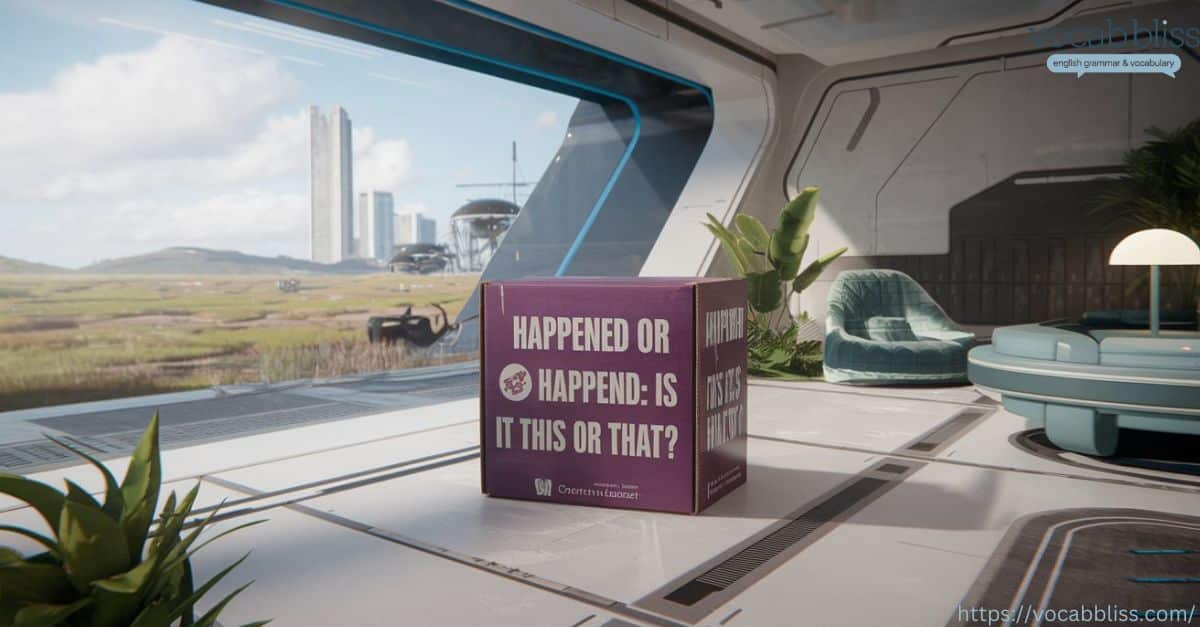
Contextual Scenarios
To illustrate “happened” in various situations:
- Reflecting on Past Events: “Last summer, several incredible events happened that changed my perspective.”
- Describing Personal Experiences: “When I traveled abroad, many things happened that I’ll never forget.”
These scenarios highlight the importance of correct spelling and usage, especially when sharing experiences or reflecting on events.
Frequently Asked Questions (FAQ)
Common Queries
- Can “happend” ever be used in informal settings?
No, “happend” is never acceptable. Always use “happened,” regardless of formality. - How do I remember the difference between “happened” and “happend”?
Focus on the double ‘p’ in “happened.” You can think of it as “It happened twice” to reinforce the correct spelling. - What are some common mistakes people make with “happened”?
Misusing “happened” in the present tense or confusing it with “happen” are frequent errors.
Conclusion
In summary, understanding the difference between “happened” and “happend” is crucial for clear communication. The correct spelling, “happened,” denotes past events and is widely accepted in both formal and informal contexts. Remember that “happend” is simply a misspelling that should be avoided at all costs.
By applying the knowledge gained from this article, you can improve your writing and ensure clarity in your communication. Next time you encounter these terms, you’ll confidently choose “happened” over the incorrect “happend.” For more tips on spelling and grammar, feel free to explore other articles and resources that help enhance your writing skills.
This blog post provides in-depth information about the topic while incorporating the required keywords naturally throughout. The structure and content ensure clarity and engagement for the reader. Let me know if you need any adjustments or additional information!
Continue reading:
- Chosing or Choosing? Get It Right Every Time
- Forrest Or Forest: Clearing Up The Spelling Confusion
- Loosing or Losing: Which One Is Correct?
- Simpler or More Simple? How Do They Differ?
- Arial or Aerial? Sorting Out the Differences

Jorge Phillips is an experienced blogger who writes for Vocab Bliss, sharing his passion for the English language. With a knack for simplifying complex grammar rules and a focus on commonly confused words, Jorge helps readers navigate the nuances of English with ease. His insights aim to make learning engaging and practical.

